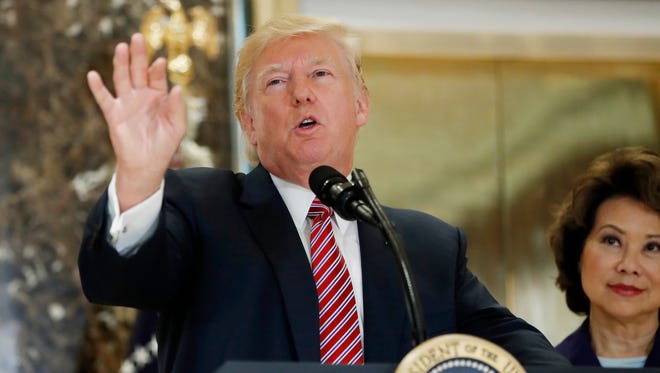Trump, North Korea, JFK, Cuba and World War I: Look to history and stay worried
Trump has managed to do what Kennedy desperately sought to avoid: box himself in with rhetoric.

In one key respect, the crisis between the United States and North Korea is — thank God — nothing like 1962's far more dangerous Cuban missile crisis. America's adversary then was a genuine superpower, the Soviet Union, and its missiles were a mere 90 miles away. Historians say had a nuclear war occurred, 55% of Americans —100 million people in 1962 — could have been killed. It was truly an existential threat. That’s hardly the case now.
But the reason disaster didn't occur then is the one reason that makes it seem likelier now. In 1962, the principals were President John F. Kennedy and Soviet leader Nikita Khrushchev — two men who had been to war two decades before and knew its horrors. Kennedy fought the Japanese in the Pacific, Khrushchev took on the Nazis at Stalingrad, the cataclysmic battle that broke Hitler’s back.
Their searing memories of war, and the fact they knew each other personally and had previously traveled to each other's country (Kennedy long before he became president), added a personal dimension that helped both navigate the dangerous shoals of the crisis.
This is what makes the current standoff between President Trump and Kim Jong-un so dangerous. Kim has for now backed off his plan to attack Guam ( "very wise," Trump tweeted, following his "fire and fury" and "locked and loaded" threats). But North Korea said "the foolish and stupid conduct of the Yankees" could change Kim's mind.
Neither Trump nor Kim has firsthand knowledge of war or personal experience with his adversary. Neither has traveled widely or shown any interest in relevant history, and both are, to a certain degree, disconnected from the reality and the gravity of what they’re dealing with. While Kennedy and Khrushchev chose their words with extreme care, Trump and Kim hurl verbal thunderbolts at one another, ratcheting up the stakes with each threat. Their language and incendiary tone — seemingly fueled by hubris, ignorance and macho one upmanship — is shockingly reckless and raises the odds of miscalculation. The only friend they have in common is the cross-dressing NBA hall of famer Dennis Rodman.
More:Sen. Dianne Feinstein: Keep Iran nuclear deal and apply lessons to North Korea
More:Shaky Trump team isn't ready for North Korea nuclear crisis
Trump has managed to do what Kennedy desperately sought to avoid: box himself in with rhetoric. JFK sought to defuse the crisis and keep his options open; Trump’s options seem to narrow every time he opens his mouth. In the face of grave danger, Kennedy saw the wisdom of consulting with his two living predecessors, Dwight Eisenhower and Harry Truman. There are five living ex-presidents today. There’s no evidence that Trump — who has shown little but disdain for them — has bothered to call any of them. In the face of this fast-moving and unpredictable crisis, Trump has allowed his ego to get in the way of soliciting advice; this irresponsible behavior adds to the danger.
"I hate war as only a soldier who has lived it can, only as one who has seen its brutality, its futility, its stupidity,” Dwight Eisenhower once said. Trump, who received multiple deferments to avoid Vietnam (one was for alleged problems with his feet), seems to glorify it. Indeed, it very well could be that the only thing standing between the United States and war is the troika of generals Trump has surrounded himself with: Defense Secretary James Mattis, National Security Adviser H.R. McMaster and Chief of Staff John Kelly. These three, with 11 stars among them, collectively wore the uniform for decades and have led men into combat in Iraq, Afghanistan and elsewhere. Unlike Trump, they are serious and wise men who know all too well, as Eisenhower did, that war is living hell. Along with Secretary of State Rex Tillerson, they have an opportunity to explain to Trump that options beyond war exist. All four are incrementalists, careful to take things one step at a time. Such restraint is lost on Trump; we must hope they can somehow manage him.
POLICING THE USA: A look at race, justice, media
More:How Trump can still make America great: Paul Brandus
At the height of the Cuban showdown,when it really and truly looked like nuclear war was imminent, Kennedy told the “ExComm” — the group of political and military advisers he had assembled to manage the crisis — of a book he had recently read. It was The Guns of August, Barbara Tuchman’s searing and Pulitzer Prize winning account of the blunders and stupidity that led to World War I. JFK recounted an anecdote of the German Chancellor being asked how the terrible war began. "Ah! If we only knew," he replied.
It’s a shame — and danger — that we have a president who, by his own admission, doesn’t read books. Because that’s one he should be studying right now.
Paul Brandus, founder and White House bureau chief of West Wing Reports, is the author of Under This Roof: The White House and the Presidency and a member of USA TODAY's Board of Contributors. Follow him on Twitter @WestWingReport.
You can read diverse opinions from our Board of Contributors and other writers on the Opinion front page, on Twitter @USATOpinion and in our daily Opinion newsletter. To respond to a column, submit a comment to letters@usatoday.com.